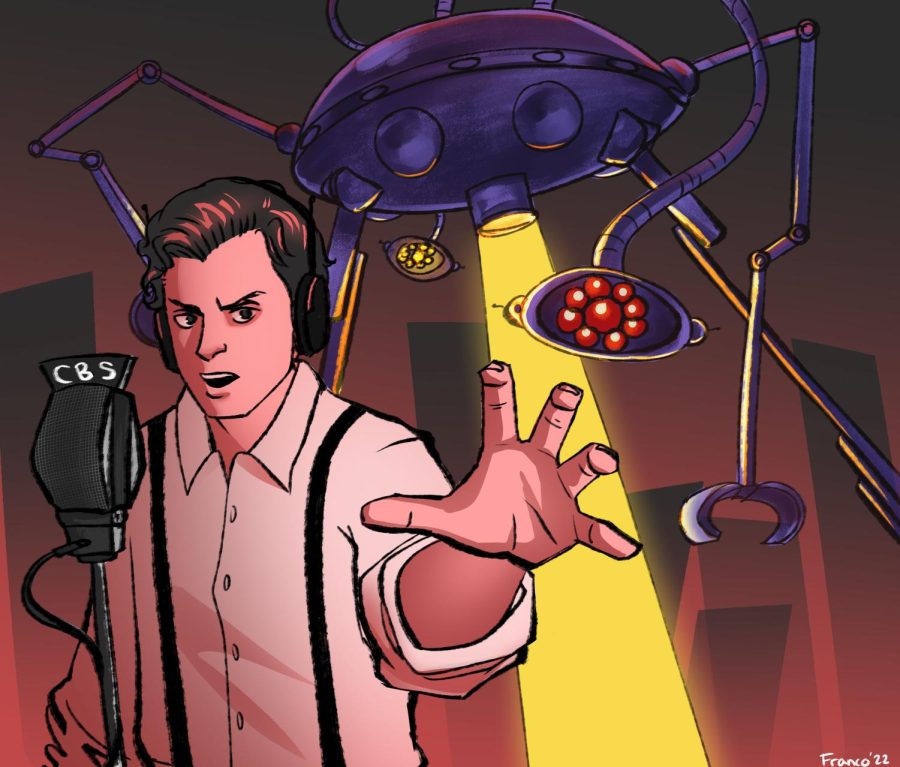Historic radio broadcast still spooks
Orson Welles’ Halloween-timed adaptation of H. G. Wells’ classic “War of the Worlds” still sparks listeners’ imaginations.
October 27, 2022
Media is a powerful tool. Pieces of media can shape one’s viewpoints, lifestyle and perhaps most importantly, their actions. In 1776, Thomas Paine’s “Common Sense” stoked the long building fires within the hearts of colonists. In the immediate aftermath of 9/11, Disney Channel commercials aired where popular Disney stars expressed an undying love for their country coupled with a desire for payback. They raised an entire sub-generation of more pro-war-minded U.S. citizens.
Media has the potential to influence people in major ways. Orson Welles’ version of “War of the Worlds,” first broadcast on the eve of Halloween in 1938, is a particularly dramatic example of this.
By 1938, science fiction was a joke, almost universally considered children’s entertainment and nothing more, according to Smithsonian Magazine. The days of widespread belief in concepts such as extraterrestrial life or UFOs were in the past, while the revitalization of the genre with works such as “Star Trek” and “2001: A Space Odyssey” was still quite a ways off. Americans now prided themselves on being a nation of logic and realism.
For these reasons, CBS and Mercury Theatre foresaw no serious risks – or rewards – in producing their radio adaptation of H.G. Wells’ 1898 sci-fi hit “The War of the Worlds,” according to Smithsonian Magazine. After all, who could possibly believe in this enlightened age that actual aliens from Mars were invading Earth, especially with that invasion spanning not even 40 minutes?
What no one took into account was the wild card that was Welles, future prolific Hollywood director and producer. For now, just the small time, yet far from humble, owner of Mercury Theatre.
Welles thrived on drama and realism, thus he was rather displeased with the first draft of the radio script presented to him, finding it unrealistic and devoid of any tension, according to Smithsonian Magazine. With only hours left before the program went live, Welles barged into the broadcasting room – having just come from a disastrous rehearsal of a stage play he was directing – with a myriad of changes and additions to the script, as well as special instructions for some actors.
It was these changes, such as emphasizing the real-time reporting aspect of the story, getting a then-President Franklin D. Roosevelt impersonator to perform the government address to the people, and more, that would strike fear into the hearts of hundreds of listeners later that evening.
The program suddenly transcended from a pulpy-yet-dull fantasy plot into a full-blown horror show full of realism and gripping scenes.
To make matters worse – or better, depending on one’s view – the program did not break in with a disclaimer until almost 40 minutes in. The average listener tuning in was not reassured of the fictional nature of the story until it was far too late.
Reportedly, it wasn’t long after the beginning of the program that people were packing the streets in panic, according to Smithsonian Magazine. It was a terrifying experience for those who believed it was real. While newspapers released the following morning would give highly exaggerated reports of mass hysteria and even suicides, in reality, the most drastic actions that came of the program were a handful of farmers shooting their guns into the sky a few times.
Yet the damage was done. The public demanded an apology and explanation from Welles and his team. Welles apologized the following day at the CBS building, where he put on the character of an extremely regretful and traumatized man. It is, however, in the author’s opinion, far more likely that Welles held little true remorse for his actions.
And really, why should he? “War of the Worlds” remains one of the most acclaimed pieces of media in its genre, and for good reason. The gripping drama, the realistic-for-the-time- production, and the killer sound design all make for a one-of-a-kind experience, especially in 1938.
What was then considered a cruel trick played on society is today admired as a masterstroke of psychological experimentation. Welles himself perhaps summed it up best in his closing remarks at the conclusion of the controversial program:
“The ‘War of the Worlds’ has no further significance than the holiday offering it was intended to be. The Mercury Theatre’s own radio version of dressing up in a sheet and jumping out of a bush and saying ‘boo’ … We couldn’t poke all your windows and steal all your garden gates by tomorrow night so we did the best next thing. We annihilated the world before your very ears and destroyed the CBS.”


